Access to Rights
(1) Access to Education
The Government of Myanmar has taken significant measures to improve access to education for all communities living in Rakhine State regardless of ethnicity, religion or gender.
Children hailing from all communities are able to freely attend primary, middle and high school. However, many families still face economic and social barriers to accessing primary level schooling.
The Government is assisting those families facing economic hardships and social barriers, including through a new scholarship program underway that will enable students with need from all communities in Rakhine State to access education opportunities.
Many Muslim students in northern Rakhine State are also enrolled for courses at the University of Distance Education.
A destabilisation in the security environment has affected the ability of some high school graduates in northern Rakhine State to complete their tertiary education at universities.
The Government is committed to providing greater access for students from Muslim communities living in northern Rakhine State to graduate from institutions outside Rakhine State.
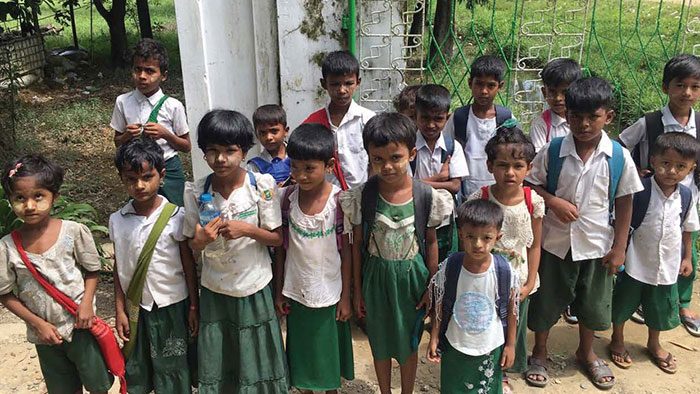

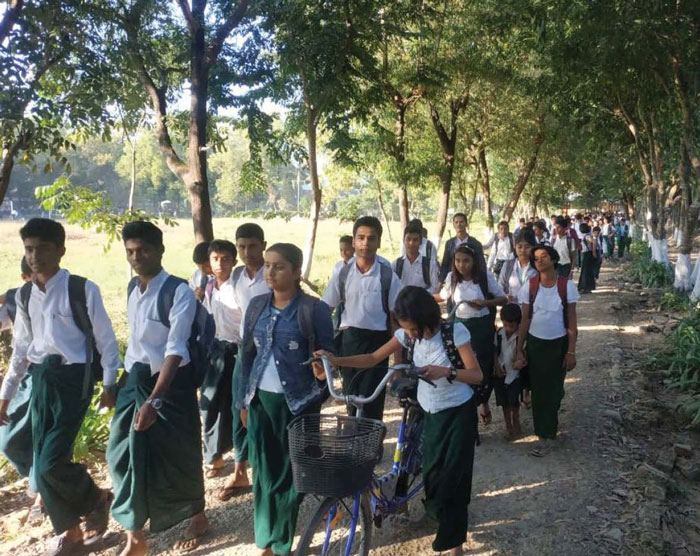
School children in Maungdaw December 2019
(2) Pathway to Citizenship
There is ongoing citizenship verification process in Rakhine State.
The Government is issuing National Verification Cards (NVC) to those eligible without discrimination based on ethnicity or religious belief.
Holders of NVC can apply for citizenship in accordance with the 1982 Citizenship Law.
The government has facilitated broad-based and inclusive public consultations with Muslim community leaders in Rakhine State as to how the citizenship verification process could best be implemented within their communities.
The Government has established a mobile team to expedite citizenship verification process and issue birth certificates. It has mobilized youth volunteers to guide applicants through the citizenship verification process.
(3) Access to Livelihoods
Rakhine State suffers from poverty, decades of neglect and significant under-investment.
The lack of sizable external investment and the lack of necessary capacity on the part of the people have made it difficult for members of all communities to find jobs.
To enhance humanitarian assistance, resettlement and development of Rakhine State, the Union Enterprise for Humanitarian Assistance, Resettlement and Development in Rakhine (UEHRD) was launched on 17 October 2017, aiming to mobilize the participation of the people, volunteers, private sectors and the interested donor countries, UN agencies and local and regional NGOs.
The State Counsellor leads the UEHRD and formed ten task forces to participate in the programme: (i)Construction and Infrastructure; (ii) Agriculture and livestock breeding; (iii) Economic Zones Development; (iv) Information and Public Relations; (v) Job creation and Vocational Training; (vi) Healthcare; (vii) Microfinancing; (viii) Fund raising through crowd-funding; (ix) Tourism promotion; (x) International Relations.
Recent conflict with the Arakan Army (AA) has further limited access to livelihoods for people living in and around conflict affected areas.
Technical and vocational training (TVET) programmes are being implemented, including through partnerships with international donors and local NGOs, to help Rakhine’s people meet market demands – from operating machinery, to horticulture, to fish and shrimp farming and livestock breeding.
To create further non-discriminatory economic opportunities, the Government is channelling foreign investment into Rakhine State in the hospitality and tourism, industry, agriculture and livestock sectors.
The government has implemented a range of investment incentivisation measures including regionally competitive tax holidays and creating a more investor friendly environment.


Vocational Training, December 2018
(4) Access to Justice
In collaboration with the United Nations Development Programme (UNDP) and other international partners, the Government of Myanmar is organizing awareness raising workshops for lawyers, legal officers and judicial officials on issues ranging from human rights, adherence to the rule of law, access to justice, gender equality, and due process in Rakhine State.
The ASEAN Coordinating Centre for Humanitarian Assistance on Disaster Management has sent observer missions and put into place capacity building programmes to support the repatriation process.
The newly established Rakhine State branch of the Myanmar National Human Rights Commission and the Office of Legal Aid Service are assisting Rakhine’s people enhance their understanding of the rule of law and raising their awareness of fundamental rights.
Pro-bono public legal defence teams have been established at the township and district levels to provide legal assistance to those in need.
The Advocate Generals Office of Rakhine State has established a Rule of Law Centre in Sittwe Township to increase trust and cooperation between justice providers and the communities they serve in Rakhine State.
Building Social Cohesion
(1) Community Outreach and Mobilization
Government and local NGOs have partnered to deliver over 200 awareness raising and capacity building trainings throughout Rakhine State.
Trainings have covered issues ranging from intercultural understanding, social cohesion, social media and hate speech awareness, peace building and mediation designed to promote intercommunal and religious harmony.
More than 35 youth camps were organized that were designed to build understanding, respect and trust among young people of all communities living in Rakhine State and to improve their ability to work with each other and to take the lead in promoting social cohesion within individual and among different communities.
The government, in partnership with local NGOs, also organized more than 100 community dialoguesand stakeholder meetings to promote both horizontal and vertical social cohesion. Government agencies also provide support to NGOs that are promoting social cohesion at the grass-root level.
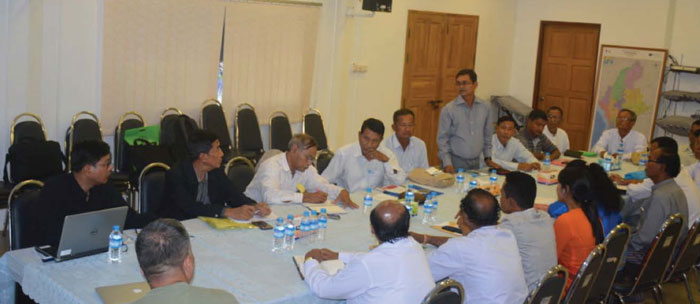
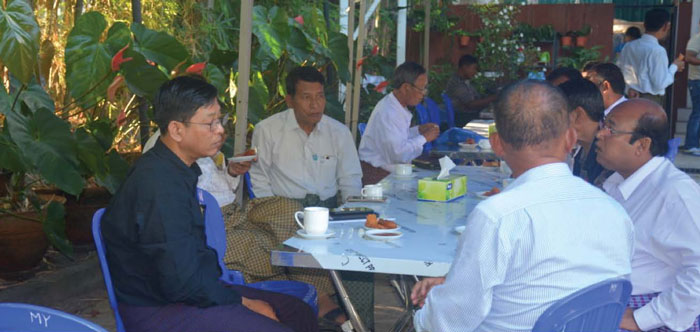
Community Dialogues
(2) Promoting Women Participation
Recognizing the role of women in finding a long lasting and sustainable peace in Rakhine, the Government, in collaboration with local NGOs, is currently mobilizing women from all communities living in Rakhine State to establish the very first, inclusive and multi-faith women’s organization in Rakhine.
To date, women representatives from different communities are holding regular meetings across Rakhine State to organize the very first women’s forum in Nay Pyi Taw in March 2020. At the forum, the most inclusive, multi-faith and inter-communal women organization will be launched, which will focus on preventing gender-based violence,
promoting gender equality and enhancing the role of women in community development and conflict prevention.
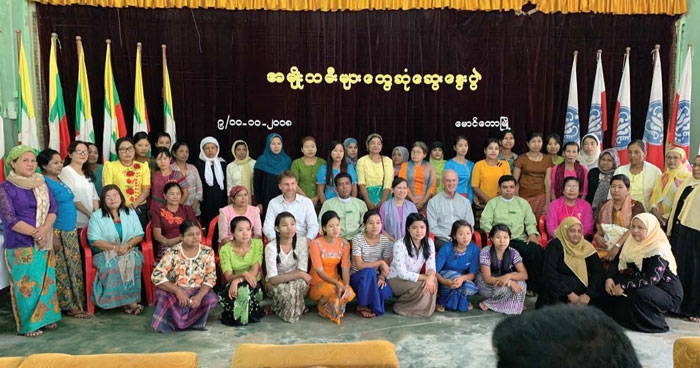
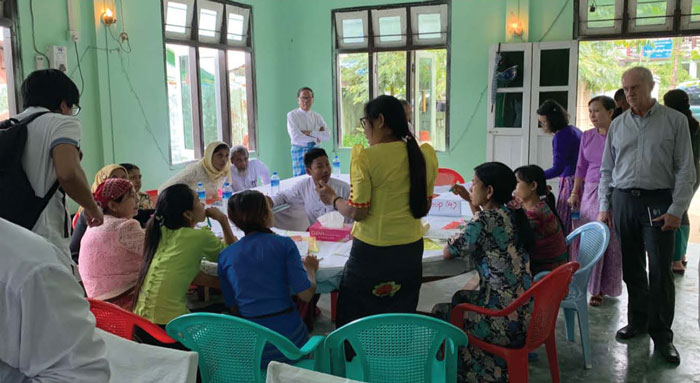
Women’s Forum Maungdaw, Northern Rakhine State, October 2018
(3) Promoting Interfaith Dialogue
The Government of Myanmar has placed a special emphasis on promoting interfaith dialogue in order to bring about a better understanding among different faith groups, creating a more harmonious environment amongst diverse communities, and halting the dissemination of hate speech.
An inaugural Interfaith Dialogue was launched in Nay Pyi Taw in April 2018 with representatives from all faith communities, government officials and parliamentarians from Rakhine State in attendance.
An Interfaith Friendship Group was established to promote communal harmony and peace among different religious communities, with 128 Interfaith Friendship sub-groups established throughout the country.
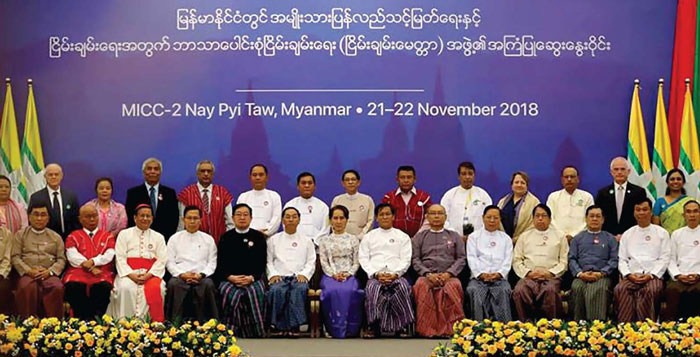
The State Counsellor with participants at the Religions for Peace Forum November 2018
(4) Addressing Discrimination
Local discriminatory regulations and orders specific to Northern Rakhine State were in place well before the current democratically- elected government took office.
The current government is committed to addressing discrimination among communities in Rakhine State.
Accordingly, in August 2018 the government revoked restrictive local directives/orders issued by the Border Immigration Headquarters and the Directorate of People’s Militia and Border Guard Forces of the Ministry of Defence.
Anti-Hate Speech Law is currently being drafted and the government has sought to expedite its adoption by the Parliament.
(5) Deterring Hate Speech
The Government has put in place administrative and legal measures to deter hate speech, which hampers inter-communal cohesion and trust building among the communities.
The Bill of Anti-Hate Speech Law is currently being drafted by the Ministry of Home Affairs with the Ministry stepping up its efforts to push through the Bill for an early adoption by the Hluttaw.
Trust and Confidence Building in Rakhine State
(1) Modernization of Myanmar’s Police Force (MPF)
The government is leading efforts, in partnership with the EU, to transform the Myanmar Police Force into a modern police service that adheres to international best practices and respects human rights.
Training and capacity building programs are being conducted to enhance the performance and capacity of security forces, including non-violent crowd management, community policing, building institutional accountability and trust.
(2) Actions on Ending Sexual Violence in Conflict
Myanmar signed an agreement with the United Nations Special Representative on Sexual Violence in Conflict on 7 December 2018 to address conflict related sexual violence in Myanmar. Under the agreement, Myanmar authorities shall implement specific time-bound commitments that include the issuance of clear orders through chains of command prohibiting sexual violence and accountability for breaching these orders, as well as timely investigation of alleged abuses.
A National Committee on Preventing and Responding to Conflict-Related Sexual Violence has also been established to further implement priority areas within the agreement with the assistance and suggestions from the Special Representative of the Secretary General of the United Nations. The Committee is drafting a National Complaint Mechanism and Action Plan to better focus efforts on prevention, protection, investigation and responses to violence against women.
(3) Actions on Protecting Children’s Rights
Myanmar’s Union Parliament enacted the Child Rights Law in July 2019 – the most comprehensive child rights-related law in Myanmar with extensive provisions for the rights of children and a focus on prevention of all forms of violence against children with an entire chapter devoted to addressing the rights of children facing armed conflict.
An Inter-Ministerial Committee for the Prevention of Grave Violations during Armed Conflict was established in January 2019 tasked with developing a National Complaint Mechanism and Action Plan to prevent killing, maiming, and sexual violence against children.
Myanmar is also working together with the UN Country Task Force on Monitoring and Reporting (CTFMR) on Grave Violations Against Children.
Since signing an Action Plan to Prevent the Recruitment and Use of Children by the Myanmar Armed Forces, almost 1,000 minors have been released.
Minors have been reintegrated into the community with verified cases of new recruitment decreasing dramatically in recent years.
Myanmar ratified the Optional Protocol to the Convention on the Rights of the Child on the involvement of children in armed conflict in September 2019.
(4) Actions on Non-Discrimination against Women
Myanmar submitted its report titled “The Situation of Muslim Women and Girls in Northern Rakhine State” in accordance with CEDAW obligations in February 2019.
The Government is implementing its National Strategic Plan for the Advancement of Women (2013-2022) – the first sector plan adopted since the country’s democratic transition began – which includes strengthening violence-against-women response mechanisms, establishing one-stop support centres, free counselling and health services, cash transfers, shelter homes, and skills training for rehabilitation.
(5) Supporting Mothers and Children
Maternal and Child Cash Transfer Programmes have been stepped up in Rakhine throughout the 2017-2018 fiscal year.
Monthly cash assistance of 15,000 MMK per person and education sessions on nutrition, hygiene, health and family planning are being provided to women two months into their pregnancy up until their child reaches two years of age in collaboration with UN agencies including UNICEF, WFP, ILO, and INGOs such as Save the Children, and the IRC.
Repatriation
(1) Bilateral Agreements between Myanmar and Bangladesh
Myanmar has signed bilateral agreements with Bangladesh, has engaged with its international partners, and is prepared to ensure voluntary, safe and dignified repatriation of displaced persons in accordance with the following bilateral agreements:
Arrangement on Return of Displaced Persons from Rakhine State (23 November 2017)
Terms of Reference for the Joint Working Group on the Repatriation of Displaced Myanmar Residents from Bangladesh (19 December 2017)
Physical Arrangement for Repatriation of Displaced Myanmar Residents from Bangladesh under the Agreement on Return of Displaced Persons from Rakhine State (16 January 2018)
(2) International Partnerships
International partners are providing support and diplomatic assistance to move forward the repatriation process.
Regional and international partners, including but not limited to China, India, Indonesia, Japan and Turkey have been providing substantive financial and in-kind support.
Japan’s Foreign Minister and Japanese Ambassador to Myanmar have visited Rakhine State multiple times in order to seek a deeper understanding of challenges faced and to identify long term, sustainable solutions to repatriation.
Several domestic and regional private sector partners are supporting government efforts to encourage greater economic engagement in Rakhine State.
The ASEAN Emergency Response and Assessment Team (ASEAN-ERAT) Team, the AHA Centre, led by the ASEAN Secretariat have made frequent visits to Myanmar to better identify areas of cooperation and to facilitate repatriation.
(3) Preparation
Myanmar is prepared to receive all voluntary returnees in accordance with bilateral agreements signed.
“It is evident that efforts have been made by the Government of Myanmar to facilitate a smooth repatriation process.” (March 2019 ASEAN-ERAT Assessment).
(4) Returnees
A total of 415 individuals, including 239 males and 176 females, have returned on their own accord and have been welcomed at reception centres, provided with assistance including the issuance of NVC, and relocated to the places of their choosing.
Cash for work programmes have been established to facilitate the reconstruction of damaged homes, and the construction of new homes at or nearby the location of former residence.
Two attempts at repatriation failed: 15 November 2018 and 22 August 2019 respectively.
Closure of IDP Camps
(1) National Strategy
A National Strategy on Resettlement of Internally Displaced Persons (IDPs) and Closure of IDP Camps was launched on 19 November 2019.
Myanmar is working with a preeminent Swiss humanitarian and international human rights lawyer.
The Strategy, drawn up in keeping with international norms and standards, calls for close collaboration with UN agencies and international organizations to resettle tens of thousands of IDPs in shelters across the country.
The Government is also working with UN agencies, the Red Cross, NGOs, and the military and Ethnic Armed Groups to help create an environment safe for return.
(2) MOU Between Myanmar and UNDP and UNHCR
An MoU between Myanmar, the UNDP and UNHCR was signed on 6 June 2018 and has been extended till 5 June 2020.
A subsequent Technical Working Group (TWG) was established to implement the MoU.
UNDP and UNHCR teams have conducted four independent Field Assessments and are currently implementing 43 Quick Impact Projects (QIPs).
UNDP and UNHCR are now developing a concept note for medium term plan for resettlement.
Accountability
(1) Independent Commission of Enquiry (ICOE)
Established on 30 July 2018, the ICOE has been mandated to collect first hand information, documentation, and other supporting evidence from government agencies related to incidents that occurred on and following the attacks of 25 August 2017 and subsequent violence which occurred in thereafter in Rakhine State.
The ICOE issued a “Call for Submissions” in English, Myanmar, Bengali and Rakhine language in December 2017, and have to date conducted interviews with approximately 1,500 witnesses from various communities in Northern Rakhine State.
Interviews included 29 military personnel who were assigned to affected areas in Northern Rakhine State during security operations which took place from 26 August to 5 September 2017, and 20 police personnel who were stationed at the 30 police outposts that were attacked in the early hours of 25 August 2017.
The ICOE has established an Evidence Collection and Verification Team (ECVT) and has met with the Judge Advocate General, leaders of the Court of Inquiry and Legal Advisory Team from Tatmadaw.
The ICOE shared relevant findings to Myanmar’s Commander-in-Chief on 22 November through the Office of the President for further investigation through the Court of Inquiry and/or Court-Martial.
The ICOE intends to dispatch its ECVTs to collect further evidence in Cox’s Bazar, with the Bangladeshside having given its consent on 28 November 2019.
(2) Military Court of Inquiry
Established on 18 March 2019 and supported by a Legal Advisory Team, the Military Court of Inquiry has been mandated to investigate incidents related to the terrorist attacks which occurred in Buthidaung-Maungdaw region of Rakhine State.
Based on the opinion of the Military Court of Inquiry, a Court Martial commenced on November 26th, 2019 in connection with incidents which took place in Gu Dar Pyin Village, Buthidaung Township in 2017.
(3) Special Unit on International Criminal Justice
Established on 26th November 2019 and led by the Union Attorney General’s Office, comprising of officers from the Ministry of Foreign Affairs, the Union Attorney General’s Office and the Office of the Judge Advocate General, with a mandate to further strengthen Myanmar’s capacity to investigate and prosecute international crimes.
Useful Websites
Government Websites
UNITED NATIONS WEBSITES
- http://www.un.org
- https://unog.ch/
Quick Links
- President Office
- State Counsellor Office
- Ministry of foreign Affairs
- Ministry of Immigration and Population
- Ministry of Hotels and Tourism
UMFCCI - Travel Information
